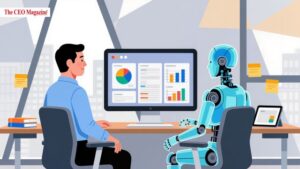Amplify Your Leadership Voice Worldwide
Join 7,000+ industry leaders sharing insights with millions of professionals globally
Email us: corporate@theceo.in Call Now: 011-4121-9292












Join 7,000+ industry leaders sharing insights with millions of professionals globally

With the rapid changes in technology and work culture, it’s important for founders like you to stay ahead of the game. In this post, I will explore what the future of work looks like and how you can adapt your strategies to ensure your business thrives. We’ll cover emerging trends, the importance of flexibility, and how to create a supportive environment for your team. Join me as we examine the preparations necessary for a successful future in the ever-evolving world of work!
The landscape of work is transforming rapidly, with companies faced with new challenges and opportunities in how they manage their teams. The shift in workforce dynamics is not just about where people work, but also how they relate to their jobs and each other. As the boundaries between personal and professional life blur, founders must adapt to evolving employee expectations regarding work-life balance, flexibility, and inclusion. This change is driven by a deep desire for autonomy and job satisfaction among employees, shaping the future of workplace culture.
Remote work has surged as a viable option for businesses of all sizes, reshaping traditional office environments. Companies that once relied on in-person interactions now leverage technology to enable seamless communication and collaboration. A study in 2022 highlighted that over 70% of employees favored continuing remote work due to its numerous benefits, including saving time on commutes and increased productivity. Founders must learn to navigate this shift to unlock the full potential of a remote workforce.
A hybrid work model is becoming the new norm, combining the best of both remote and in-office settings. This model allows employees the flexibility to choose when and where they want to work, fostering a sense of ownership over their schedules. Organizations implementing hybrid strategies see increased employee satisfaction and retention rates. It’s vital to establish clear guidelines and tools that support collaboration, ensuring that remote employees feel included and engaged, regardless of their location.
To effectively embrace a hybrid model, I recommend investing in technology that supports seamless communication and collaboration, such as virtual meeting platforms and project management tools. Setting a consistent schedule for in-person teamwork days can help maintain team cohesion while still allowing for the flexibility that remote work offers. Regular check-ins and feedback loops are vital for understanding individual needs and expectations, creating an inclusive environment. By embracing this model, I can ensure all team members make meaningful contributions, leading to a more dynamic and innovative workplace.
The landscape of employment is being transformed by rapid technological advancements. From remote collaboration tools to flexible work management software, these innovations are reshaping how I lead teams and engage with clients. As founders, understanding the implications of technologies like automation and artificial intelligence will be vital in staying competitive and optimizing workplace efficiency.
Automation poses both challenges and benefits in the workforce. While it may seem like a threat to jobs, it can also enhance productivity and free up employees to focus on more creative and strategic tasks. Companies using automation tools have reported a significant drop in manual tasks, allowing teams to devote time to innovation and improving customer experiences.
AI is becoming a game changer in the way I make decisions in my business. By analyzing vast amounts of data quickly, AI algorithms can identify trends and insights that would take human beings much longer to process. This allows me to act decisively, based on data-driven predictions rather than gut feelings, thereby increasing success rates in project outcomes.
Diving deeper into the role of AI in decision making, specific applications have demonstrated invaluable advantages. For instance, predictive analytics can forecast customer behaviors, guiding me in tailoring marketing strategies. A study by McKinsey revealed that companies harnessing AI have seen a 20% increase in profitability. Automating customer support with AI chatbots not only improves response times but also collects valuable data for future enhancements. Embracing these smart technologies positions us to make informed choices that drive growth and efficiency in our businesses.
Looking ahead, the skills landscape is rapidly evolving, necessitating founders to rethink what competencies will drive success. Emphasizing digital literacy, adaptability, and emotional intelligence can set your team apart. Critical thinking, creativity, and collaboration are non-negotiable. These skills enhance problem-solving capabilities and prepare employees to navigate the complexities of the modern workplace effectively.
In-demand skills often prioritize technical proficiency, especially in areas like data analytics, coding, and digital marketing. While traditional skills like effective communication remain relevant, their application is increasingly integrated with technology. A blend of both sets establishes a well-rounded workforce prepared to tackle contemporary challenges.
Fostering a culture of continuous learning ensures your team is agile and innovative. By creating an environment where ongoing education is valued, you empower your employees to explore new methods, tools, and technologies. This approach not only improves individual performance but also strengthens overall organizational resilience.
Imagine your team members attending workshops, online courses, and industry conferences regularly — that’s the magic of continuous learning. Companies like Google and Amazon emphasize skill development, leading to increased engagement and higher retention rates. Encouraging a mindset of lifelong learning transforms your workforce into a proactive, innovative unit ready to adapt to emerging trends. By prioritizing learning opportunities, you invest in your team and fortify your business against future challenges.
Future-centric company cultures must evolve to embrace the shifting dynamics of work and collaboration. With remote and hybrid work models changing the way teams interact, it’s important to foster an atmosphere that supports flexibility and inclusivity. I’ve seen firsthand how adapting values and practices can enhance employee engagement and loyalty, which ultimately drives innovation and productivity. Encouraging open communication and collaboration will benefit not just the workforce but also the overall organizational health.
Creating an inclusive workplace isn’t just a feel-good initiative; it has tangible business benefits. Studies show that diverse teams outperform homogenous ones, driving better decision-making and innovation. Striving for a culture that values different perspectives and backgrounds allows you to tap into a wealth of creativity and problem-solving capabilities. By proactively recruiting a diverse workforce and instituting policies that genuinely foster inclusivity, you position your company to excel in understanding and reaching a broader customer base.
A keen focus on mental health and well-being is important in cultivating a resilient workforce. Initiatives such as flexible work hours, mental health days, and professional support resources can dramatically improve employee satisfaction and productivity. Investing in well-being not only reduces turnover but also creates a culture where individuals feel valued and understood, which in turn boosts overall morale. I’ve found that companies that prioritize mental health see increased innovation and a stronger commitment to overarching goals.
Building an infrastructure that supports mental health is more than just offering resources; it involves creating an open dialogue where employees feel empowered to share their challenges and seek support without stigma. Implementing regular check-ins, mental health workshops, or counseling services can significantly improve overall workplace morale. By promoting a culture of support and understanding, you encourage your team members to thrive, ultimately enhancing both individual contribution and collective success.
Unforeseen challenges can disrupt even the best-laid plans, making proactive strategic planning vital. I’ve found that being adaptable is key; creating flexible business strategies allows you to pivot as necessary. Incorporating scenario planning can help forecast various potential hurdles, ensuring you’re better equipped to tackle them when they arise. Having contingency measures in place and constantly reassessing your strategy can enhance your ability to navigate unpredictability effectively.
Anticipating market trends requires a keen sense of observation and analytical skills. I rely on a combination of data analysis, customer feedback, and competitor research to stay ahead. Leveraging tools like Google Trends or industry reports can be a game-changer, offering insights into shifting preferences and emerging needs within your target market.
A resilient business model can effectively withstand external pressures and adapt to evolving circumstances. Diversification is key; by broadening your product or service offerings, you reduce dependency on a single revenue stream. I’ve noticed that companies that embrace innovation and are willing to experiment with new approaches often fare better when disruptions occur. Implementing flexible pricing strategies and investing in technology can also fortify your business against future uncertainties.
Ensuring resilience goes beyond just diversification; fostering a culture that embraces change is imperative. For instance, I’ve observed startups that implement regular feedback loops within their teams, encouraging ongoing adaptations to their service offerings based on real-time user insights. Integrating this into your business processes not only keeps your model agile but also strengthens relationships with your customer base by demonstrating responsiveness. Additionally, maintaining a financial buffer or a reserve fund can provide much-needed stability during turbulent times, giving your venture a fighting chance when faced with unexpected challenges.
Ultimately, as you navigate the evolving landscape of work, it’s imperative to embrace flexibility and adaptability. I believe that understanding emerging technologies, fostering a culture of collaboration, and prioritizing employee well-being will empower you to thrive in this new environment. By preparing your business for these changes, you position yourself and your team for sustained success. Let’s embrace the future of work together!
A: Founders need to adopt a flexible mindset when it comes to remote work. This includes implementing reliable communication tools, establishing clear workflows, and fostering a culture of accountability. Encouraging regular team check-ins and adopting a results-oriented approach are also important. Additionally, investing in employee engagement and well-being resources can help maintain morale and productivity in a remote setting.
A: Founders should look into leveraging automation tools, artificial intelligence, and cloud-based solutions to streamline operations and improve efficiency. Collaboration tools that enhance remote teamwork, as well as project management software, will also be vital. As the landscape evolves, keeping an eye on emerging technologies and incorporating them where applicable can give founders a competitive edge.
A: Founders should aim to create a workplace culture that prioritizes flexibility, inclusivity, and personal development. This includes offering remote work options, access to professional growth opportunities, and fostering a supportive environment that values diverse perspectives. Actively soliciting feedback from employees and adapting policies to meet their needs will contribute to a positive work environment and employee retention.
Join industry leaders who have shared their insights with millions of professionals globally.

Join our mailing list to receive the latest news and updates from our team.